How EFL students’ oral performances are promoted with task-based activities: An integration of multiple intelligences theory
This study aims to investigate the effect of using a task-based training program as an application
of Multiple Intelligences Theory (MIT) on developing speaking skills for EFL students. The experimental
and controlled groups each consisted of thirty first-year students majored in English Language Education
at Phu Yen University, Vietnam. The tools of the study included a speaking-training program based on
MI-oriented task-based activities to improve students’ speaking skills, a questionnaire, an interview, and
twospeaking pre- and post- tests administered to the experimental and controlled groups. The experimental speaking-training program was taught to the students during a 15-week period. The participants’ feedback from the questionnaire, the interview, and their academic scores from the pre- and post-tests were collected and analyzed. The results revealed that the program had great effects on improving the students’ learning motivation and enhancing their speaking skills. The study also proposed some recommendations and suggestions for further research.
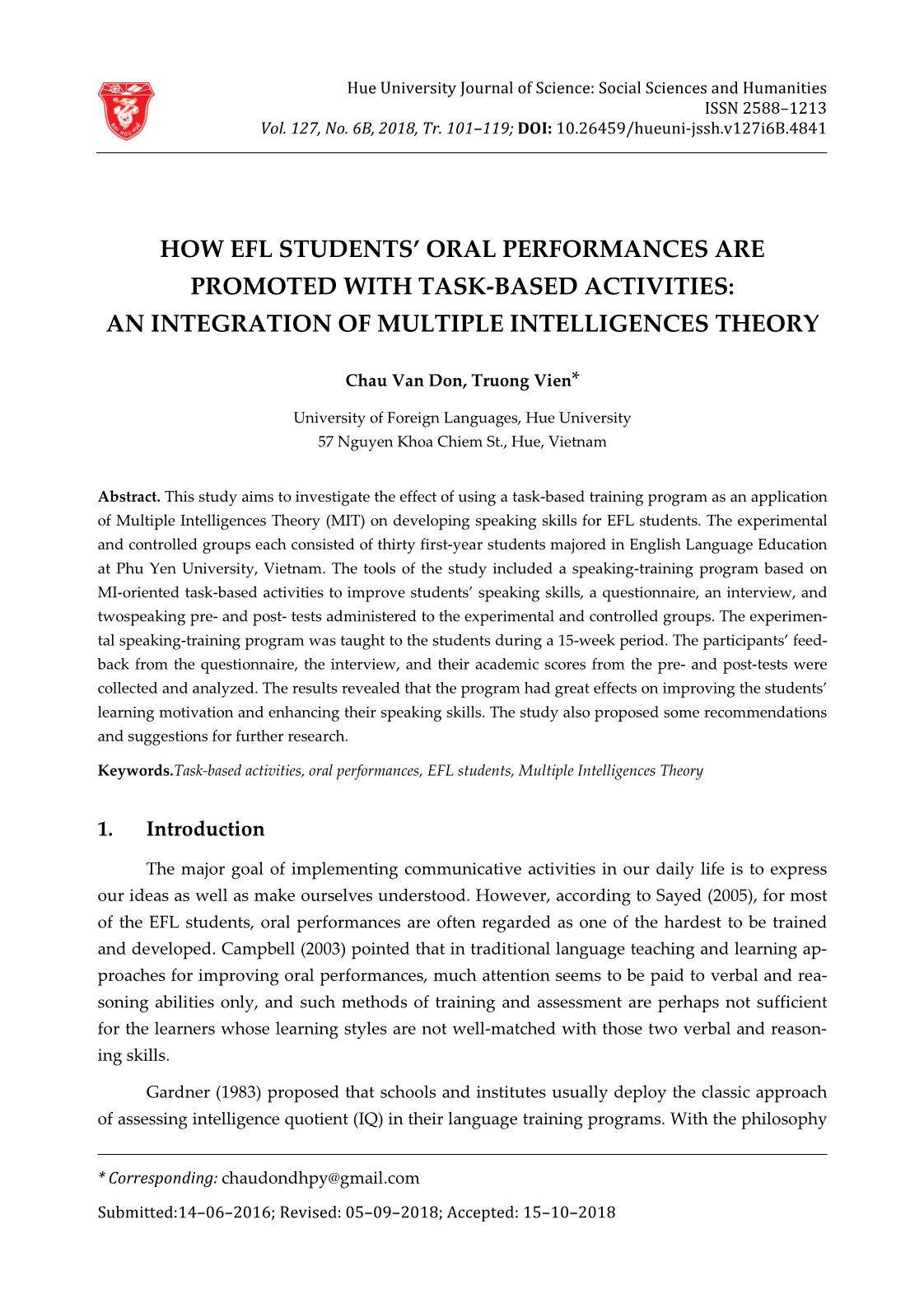
Trang 1
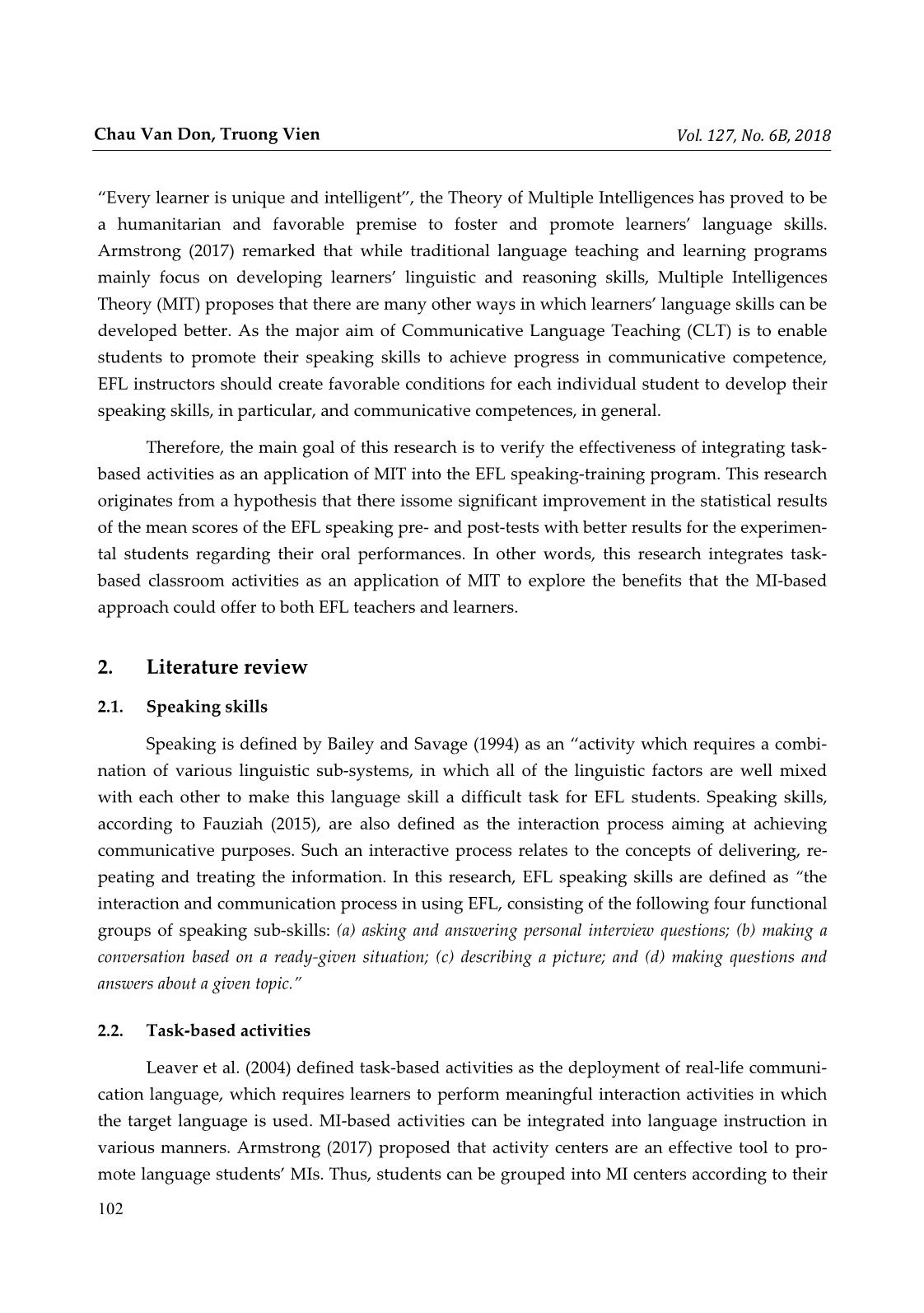
Trang 2
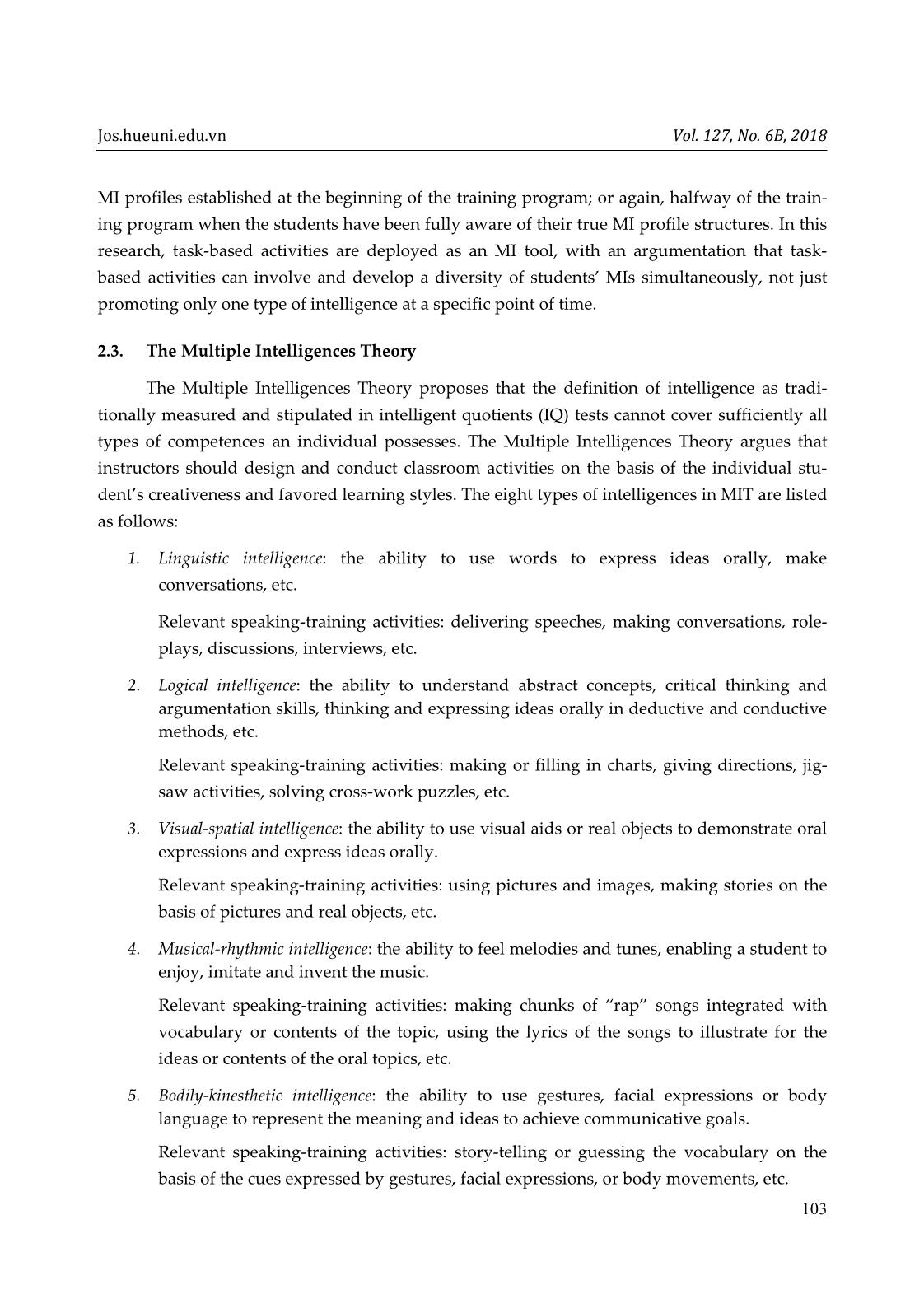
Trang 3
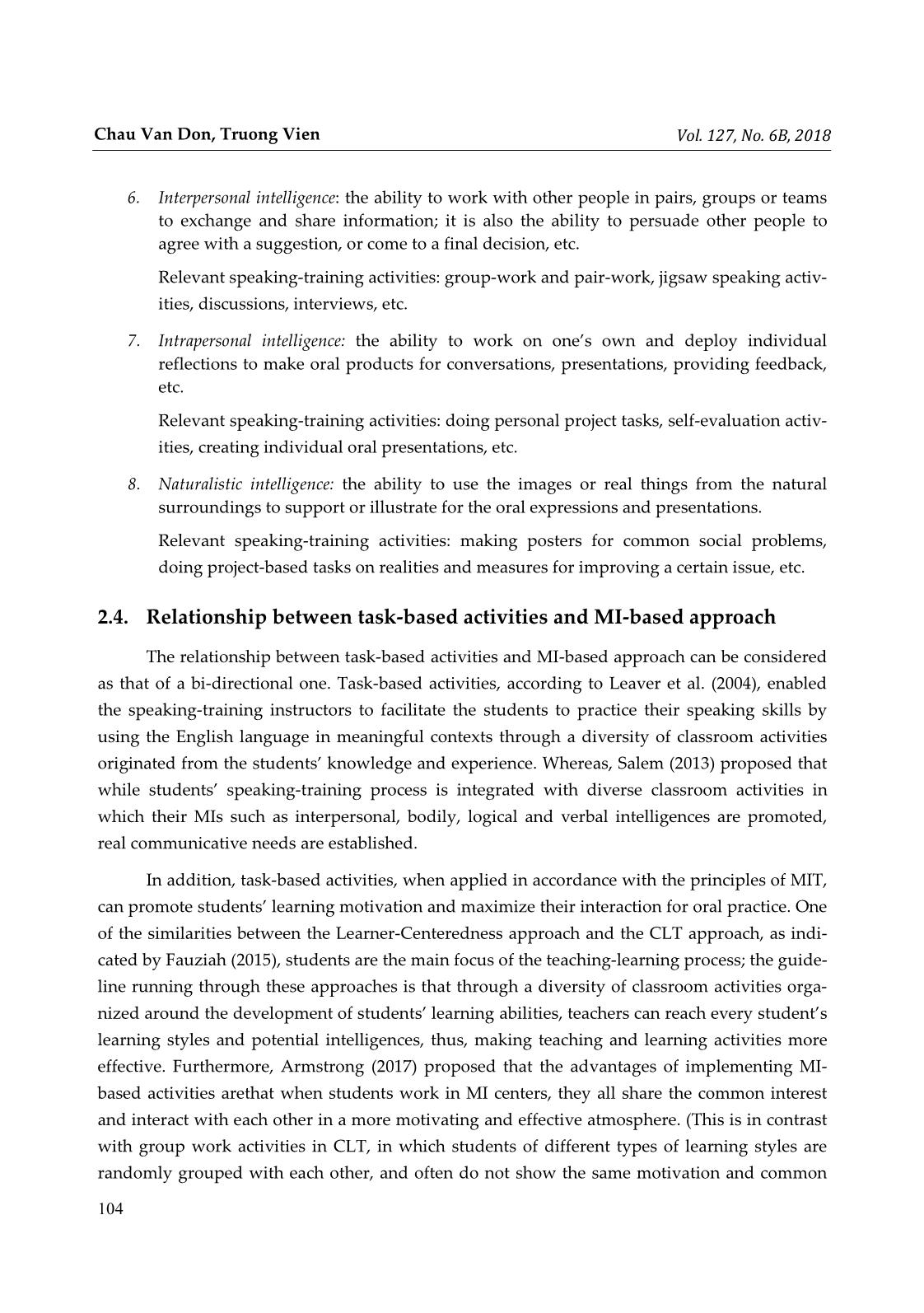
Trang 4
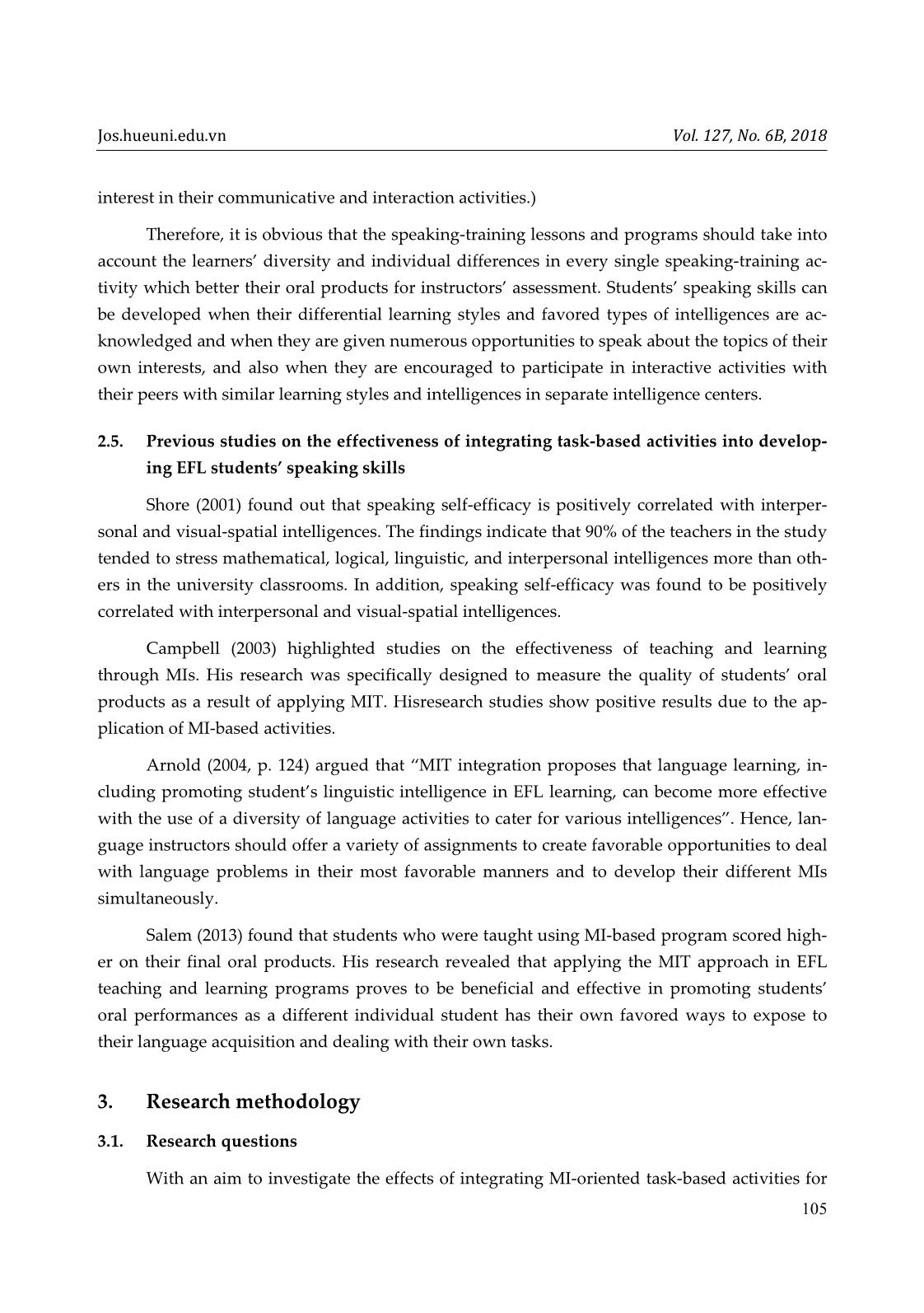
Trang 5
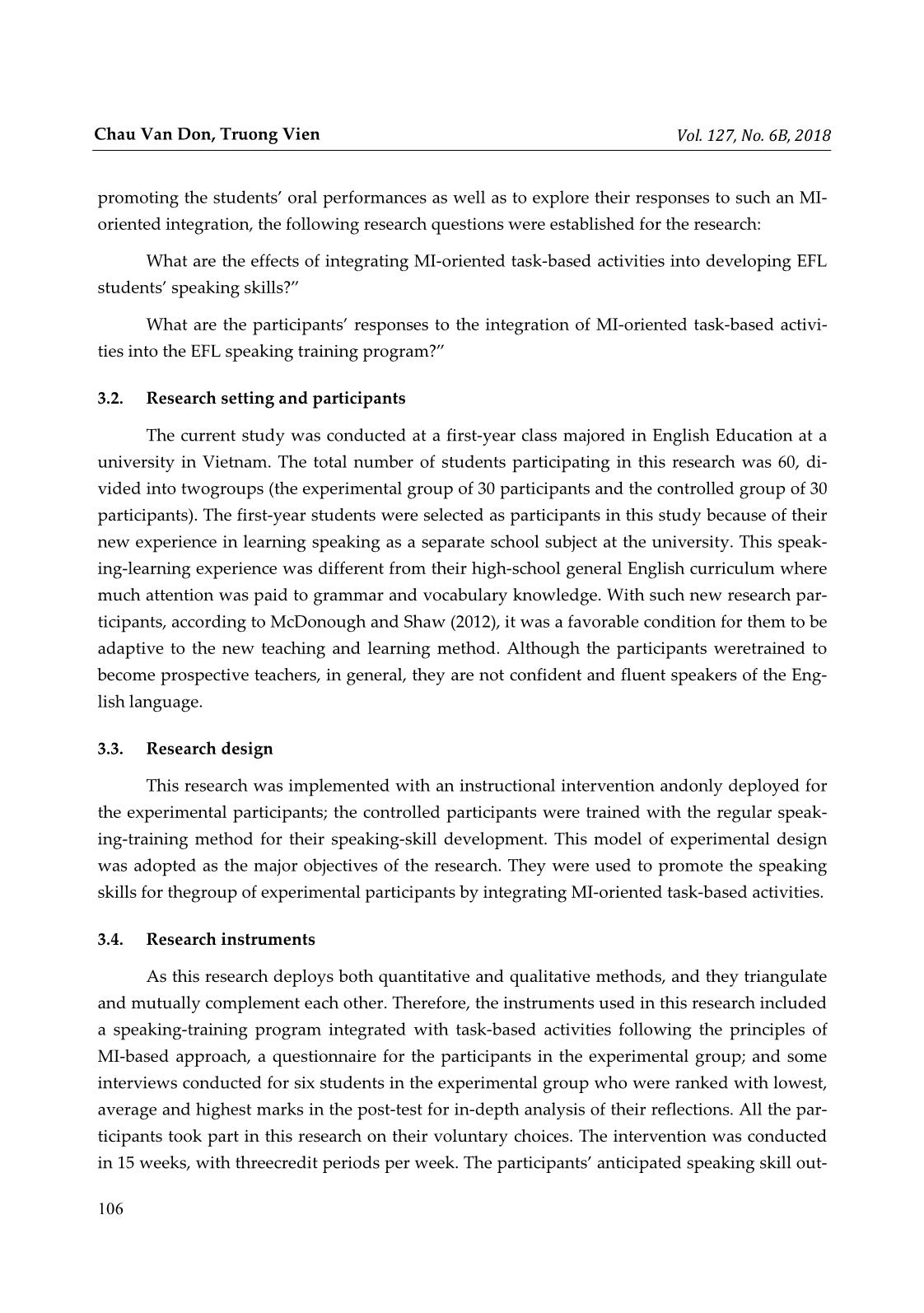
Trang 6
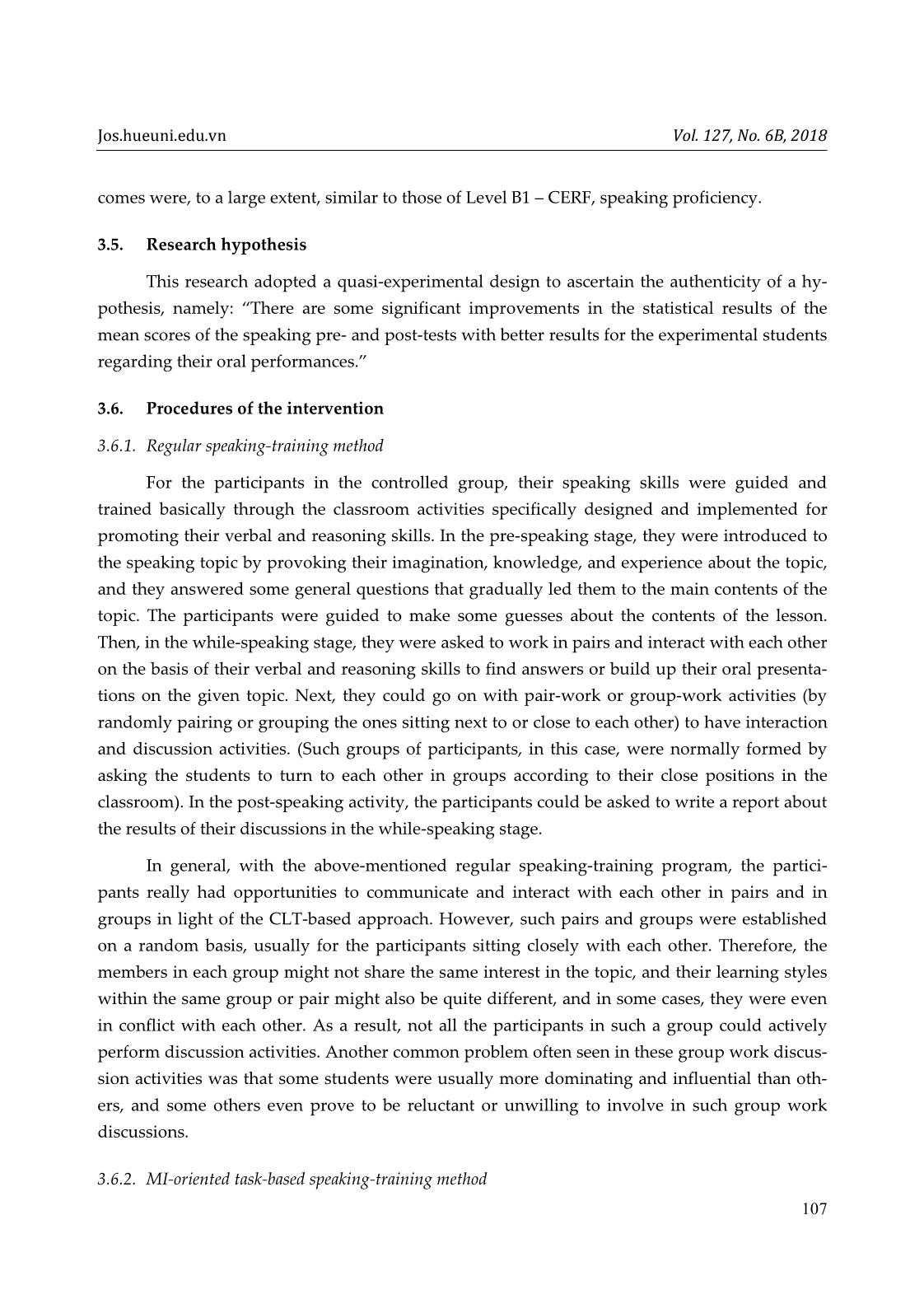
Trang 7
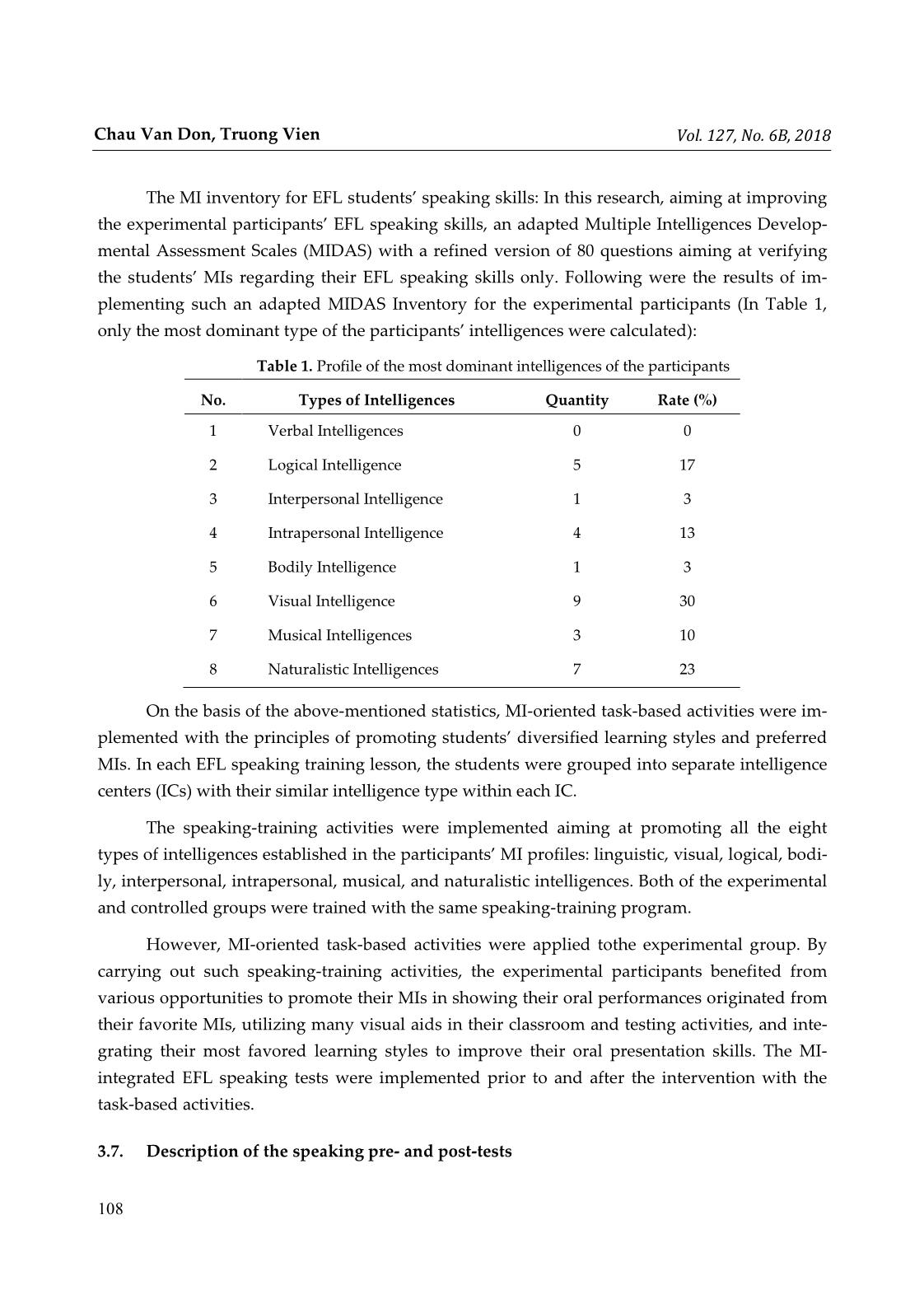
Trang 8
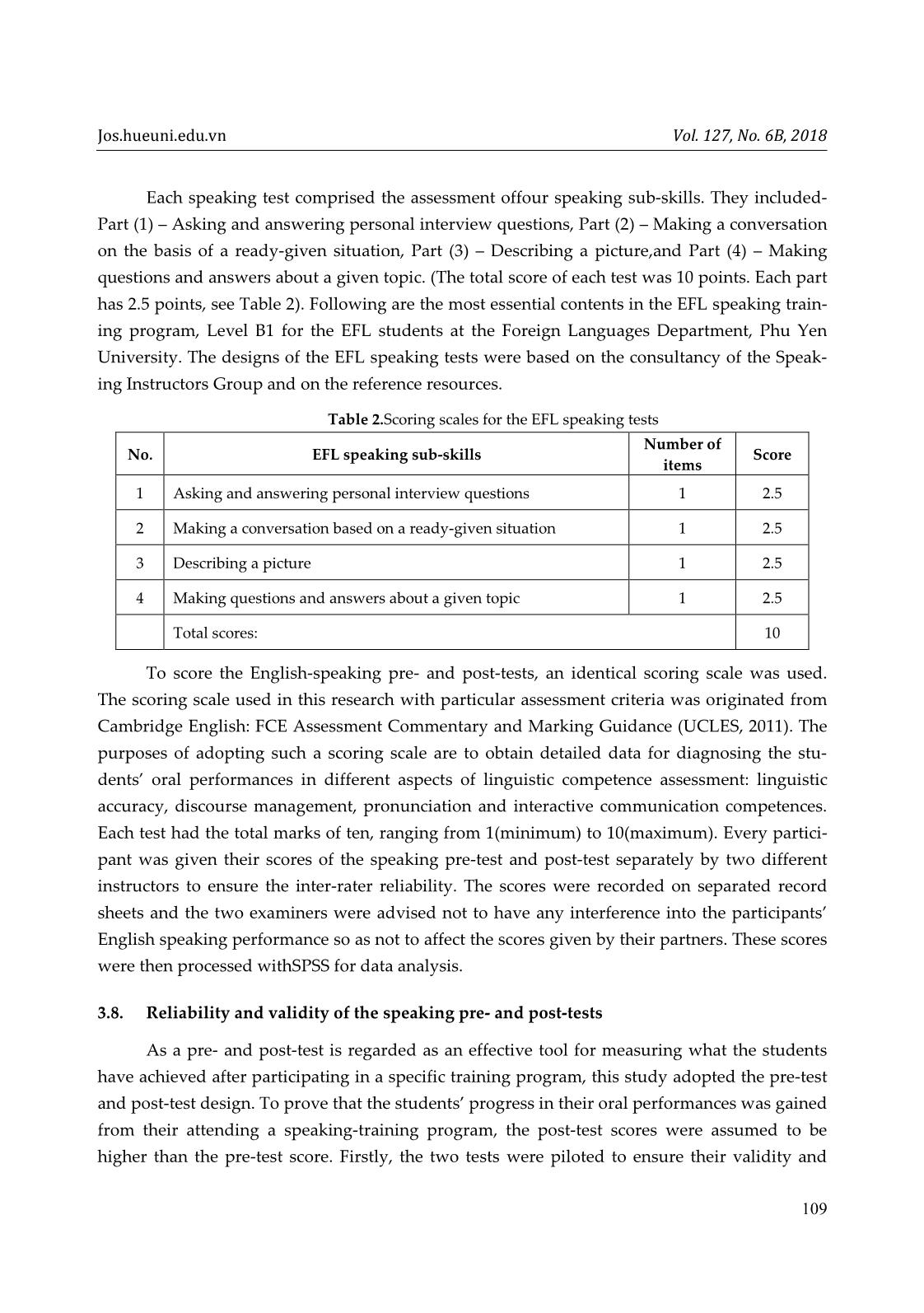
Trang 9
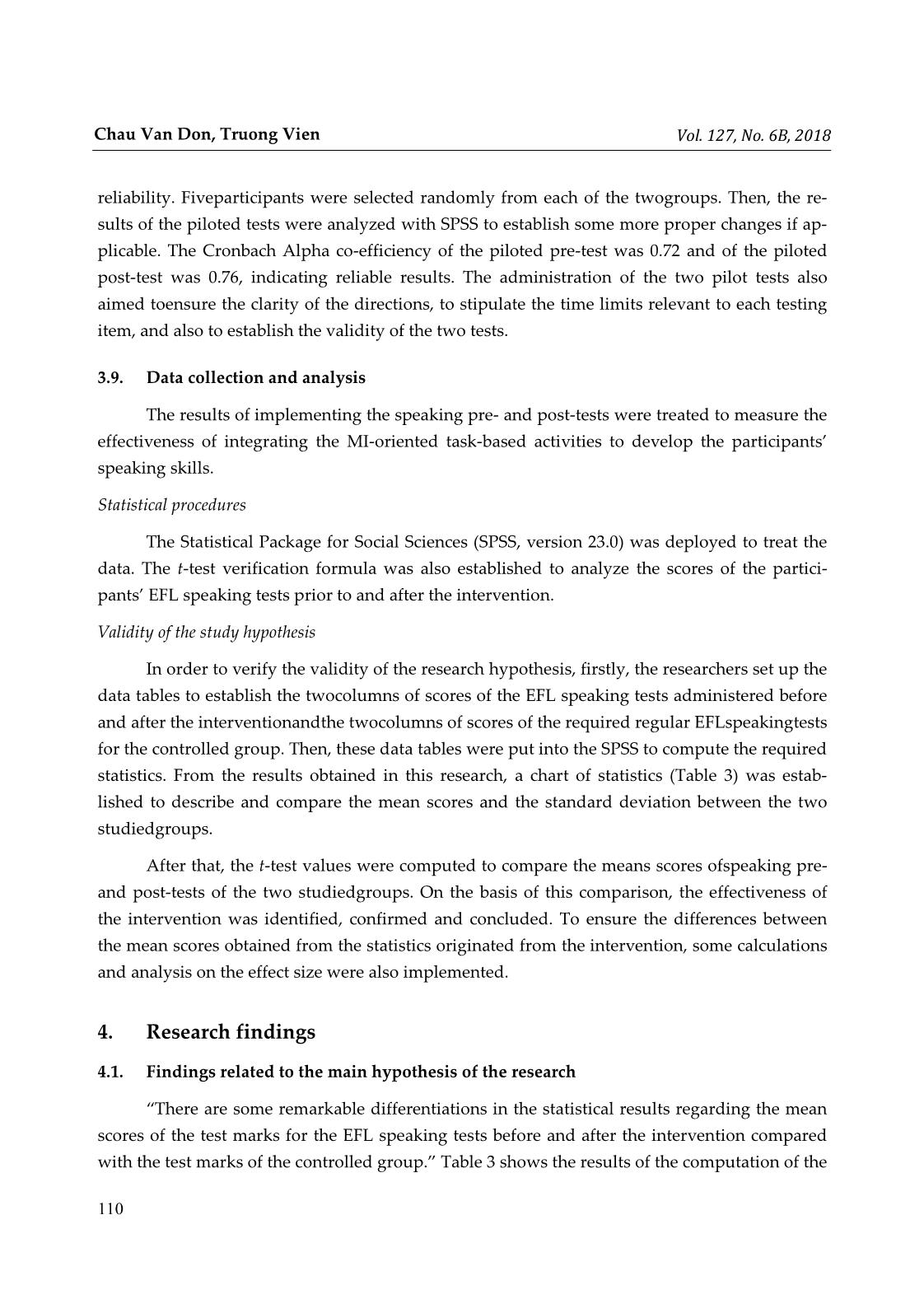
Trang 10
Tải về để xem bản đầy đủ
Tóm tắt nội dung tài liệu: How EFL students’ oral performances are promoted with task-based activities: An integration of multiple intelligences theory
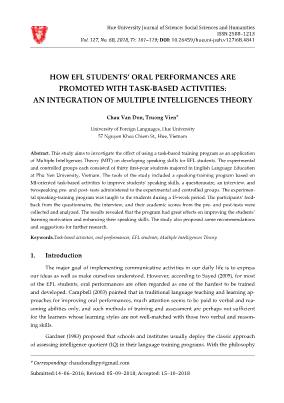
score expressed his view-point: I can speak English relatively more fluently now. I feel less nervous and anxious when I stand in front of the class to perform an oral presentation or expressing my opinions on a particular topic And another student with a low test score concluded in his answers to the interview that: Now, I feel quite confident and relativelyeasy to speak English better. I support the ideas of combi- nation of my MIs to develop my strong points in learning how to speak. 5. Discussion With p = 0.01for the EFL speaking post-test, the disparities of the mean scores between the experimental and the controlled groups weresignificant. Such differences show that this finding obtained from the process of data analysis could not happen randomly. They all were the results of integrating task-based activities into the intervention. Therefore, the hypothesis was demonstrated and accepted. In other words, the integration of task-based activities ob- viously offered positive impacts regarding promoting the participants’ oral performances in terms of doing the EFL speaking tests. To calculate the effect size, the standard deviation (SD) was established and this would enable the researcher to define the effect size of the experimen- tal program between the mean scores (MS) of the two research groupsregarding the results of the post-test. The effect size ofthis research was computed in accordance withCohen’s formula as follows: Effect size = MS������������– MS���������� SD���������� Therefore, based on the above-mentioned formula, the computation results of the effect size was 0.3. Stipulated in Cohen’s scale, the scope of effect size is classified from a very small to a very large degree depending on the real value of the effect size. The effect size value in the EFL speaking post-test shows the effect size of the intervention of 0.3 which means a large de- Jos.hueuni.edu.vn Vol. 127, No. 6B, 2018 115 gree in Cohen’s scale. The aim of this study was to explore the impacts of integrating task-based activities in the EFL speaking training program to improve the participants’ motivation and also to develop their EFL oral performances. Regarding the participants’ learning motivation, all the participants in our experimental intervention expressed their same ideas that most of the task-based activities implemented real- ly promoted their high motivation as well as the proportion of their involvement in the speak- ing training activities. All of the experimental students strongly agreed that the EFL speaking program integrated with task-based activities really offered them good chances to improve their oral performance regarding their greater self-confidence in demonstrating their EFL speaking skills and also promoting their most favored intelligences and learning styles. The findings of the research also indicated that there wereseveral remarkable differences in the statistical figures at the significance level (0.01) between the mean scores of the students from the EFL speaking pre- and post-tests with the latter being better. This might come from the positive impacts of integrating the task-based activities into the EFL speaking training program, which really created significant progress in the participants’ oral performances in doing their EFL speaking tests. These performances are (1) asking and answering personal interview ques- tions, (2) making a conversation on the basis of a ready-given situation, (3) describing a picture, and (4) making questions and answers about a given topic. Furthermore, the findings of this study were also well-matched with some previous stu- dies with MIT application in promoting EFL oral skills in the field of EFL teaching in general (Shore, 2001 and Campbell, 2003), as well as in English Language Teaching, particularly in de- veloping EFL speaking skills (Arnold, 2004 and Salem, 2013). Such a finding was in conformity with the study implemented by Salem (2013), aiming at investigating the advantages of utiliz- ing a speaking development program in which MI activities were deployed to promote the pre- service English teachers’ speaking skills. The findings of Salem’s research indicated that the intervention had some significant influence on his students’ EFL oral performances. According to the results of this research, the participants achieved significant progress in their EFL test scores. Such an achievement was brought about by the experimental intervention. The participants’ oral performances were trained to be adapted with their diverse learning styles and favored MIs in fulfilling task-based speaking activities. The participants also ex- ploited the effective use of pictures and real objects, together with various information technol- ogy applications to support their oral performances. These techniques really enabled the partic- ipants to become competent communicators, both in the classroom and also in their daily life communicative situations outside the classroom. Generally speaking, the EFL speaking pre- and post-test scores indicated that the stu- dents’ EFL oral performances have been remarkably improved as the verification of the hypo- Chau Van Don, Truong Vien Vol. 127, No. 6B, 2018 116 thesis described at the beginning of this study. The participants achieved significant achieve- ment in their EFL oral performances, which, in turn, reflectedthe benefits of integrating task- based activities into the intervention. One possible explanation for the development of the par- ticipants’ oral performances could relate to their more focus on both accuracy and fluency. Via activities such as brainstorming, taking notes on main ideas, and giving feedback on the oral presentations, the integration of MI-oriented task-based activities in the study focused on the expressions of the participants’ messages in their oral products rather than producing fluent oral products regardless of the principles of standard linguistic forms. These activities are com- patible with what El Naggar (2000) and Salem (2013) perceived that taking into account the in- dividual differences among the learners could result in enhancing the students’ accuracy in their oral performances, and what Campbell (2003) and Arnold (2004) proposed for non-native speakers that linguistic accuracy should be logically catered for in such a way that there areno impacts from such interferences on the students’ learning motivation. Another possible reason for the contribution to the participants’ positive awareness on the integration of MI-oriented task-based activities could be due to their recognition of strong points of this speaking-training approach. During 15 weeks of the intervention program, the participants’ visualization of learning how to speak gradually changed because learning how to speak with MI-based activities took place in the context of rapport between the instructor and the learners, and with good interaction among the students of the same interests and learning styles within each of the eight intelligence centers. In such a harmonious speaking-training en- vironment, the participants perceived that this active and friendly learning environment created good opportunities for them to have ideas to develop their oral products and to overcome their difficulties (for example lack of vocabulary, lack of confidence) in speaking them out. These participants also stated in their interview that the speaking-training lessons designed in light of the MI-based approach facilitated their speaking strategies as they could get help not only from their peers within their intelligence centers but also from their English speaking instructors. Regarding the external factors such as the out-of-class exposure or extra-curricular activi- ties which may influence and contribute to the results of this research, McDonough and Shaw (2012) emphasized that the research reliability and validity are highlighted and maintained in an experimental study when similar conditions of conducting the study are applied for different groups. The findings of the participants’ responses to the Introductory Part of the Questionnaire indicated that the students participating in this study did not have much out-of-class exposure such as participating in conversations with foreign speakers of English, joining in online speak- ing-training programs, attending English-speaking clubs, and the like. As the participants in this research were all first-year students, according to the results of data analysis from the ques- tionnaire, for their first academic year at the university, they put priorities on familiarizing themselves with the student’s life and showing their efforts in completing the new academic Jos.hueuni.edu.vn Vol. 127, No. 6B, 2018 117 subjectswell. Some experimental participants (eight out of thirty) expressed their plans to im- prove their oral performances by attending English-speaking club activities held by themselves in the coming time. 6. Conclusions, limitations, and recommendations 6.1. Conclusions With the philosophy “Every learner is unique and intelligent”, the Theory of Multiple In- telligences has proved to be a humanitarian and favorable premise to foster and promote learn- ers’ language skills. On the basis of the findings of this research, it can be concluded that inte- grating task-based activities following the principles of MIT has proved to be of great effective- ness in developing EFL students’ oral performances. It is proposed that applying MI-oriented task-based activities in EFL speaking-training classrooms has brought about various conve- niences for both EFL teachers and students in terms of maximizing the students’ learning out- comes by facilitating them to mobilize their most favored learning styles in demonstrating and developing their oral products. The results from analyzing the participants’ responses from the questionnaire and interview also confirmed the fact that their better learning outcomes were contributed by the positive effects of the MI-oriented task-based integration into their speaking- training program, not from the impacts of any out-of-class speaking-practice activities. In short, the application of MI-oriented task-based activities in the speaking-training pro- gram has brought about a variety of advantages for both EFL teachers and students. When task- based activities are integrated into the EFL speaking training program following the principles of MIT application, students are encouraged to work with their peers with similar types of intel- ligences in their favorite intelligence centers. By integrating MI-oriented task-based activities into the speaking-training program, students are provided with more learning instruments for developing their speaking skills both in their speaking-training lessons and the speaking tests. It is undoubtedly that with MI-oriented task-based speaking-training activities, language students are able to use various supporting instruments to promote their oral performances, especially visual aids like pictures, real objects, posters, and information technology means and products. 6.2. Limitations This research, like many other research works, cannot avoid having its shortcomings and limitations. Firstly, this researchwas limited to only 60 EFL students majored in English Educa- tion at a local university in Vietnam, which apparently is quite a small sample of a population to generalize the research scope of Vietnamese EFL learners. Secondly, it was limited to only four speaking skills for first-year students’ speaking-training program at the Foreign Languages Department at Phu Yen University: (1) asking and answering personal interview questions; (2) Chau Van Don, Truong Vien Vol. 127, No. 6B, 2018 118 making a conversation based on a ready-given situation; (3) describing a picture; and (4) mak- ing questions and answers about a given topic. And last but not least, the results of this study are confined to the Vietnamese EFL environment and the social and cultural background of the Vietnamese students within such a local university. 6.3. Recommendations for further studies In an attempt to maximize the potential findings of this research, more in-depth studies should be carried out to investigate the impact of integrating task-based activities into the stu- dents’ four-skill communicative competences. Furthermore, this study only focussed on EFL learners in the Vietnamese context. Future research may also be implemented on a larger scale of subjects, such as EFL learners in a regional or an international context. References 1. Armstrong, T. (2017). Multiple Intelligences in Classroom. 4th Edition, Association for Super- vision & Curriculum Development, Alexandria, Virginia, USA. 2. Arnold, F. and Fonseca, C. (2004). Multiple Intelligence Theory and Foreign Language Learning: A Brain-based Perspective,International Journal of English Studies, 4 (1), 119-136. 3. Bailey, K. and Savage, L. (1994). New Ways in Teaching Speaking. TESOL Publica- tions(January 1, 1994). ISBN-10: 0939791544. 4. Campbell, B. (2003). Teaching and Learning through Multiple Intelligences. Allyn and Bacon; 3rd edition. ISBN-13: 978-0205363902. 5. El Naggar, Z. (2000). Learners’ individual differences: A resource text for Egyptian primary Eng- lish educators, supervisors and teachers. Academy for Educational Development. 6. Fauziah, N. (2015).The use of multiple intelligences model to improve students’ speaking skills in discussion texts. English Language Education Faculty, Walisongo State Islamic University Semarang, Indonesia. 7. Gardner, H. (1983). Frames of Mind: The Theory of Multiple Intelligences. Basic Books, A Member of the Perseus Books Group, USA. 8. Leaver, Lou, B; Willis, Rosemary, J. (2004). Task-Based Instruction in Foreign Language Educa- tion: Practices and Programs. Georgetown University Press. ISBN 978-1-58901-028-4 9. McDonough, J. and Shaw, C. (2012). Materials and Methods in ELT,John Wiley & Sons. 10. Salem, A. (2013). The Impact of Multiple Intelligences-based instruction on develo- pingspeaking-skills of the pre-service teachers of English, English Language Teaching Maga- zine, 6 (9), 58-71. Jos.hueuni.edu.vn Vol. 127, No. 6B, 2018 119 11. Sayed, M. (2005). The effect of using a multiple intelligences-based training programme on devel- oping English majors’ oral communication skills. MA Thesis. Faculty of Education. Assuit Uni- versity. 12. Shore, J. (2001). An Investigation of Multiple Intelligences and Self-Efficacy in the University English as an ESL Classroom. Unpublished Doctoral Dissertation. Graduate School of Educa- tion, George Washington University, USA.
File đính kèm:
 how_efl_students_oral_performances_are_promoted_with_task_ba.pdf
how_efl_students_oral_performances_are_promoted_with_task_ba.pdf

